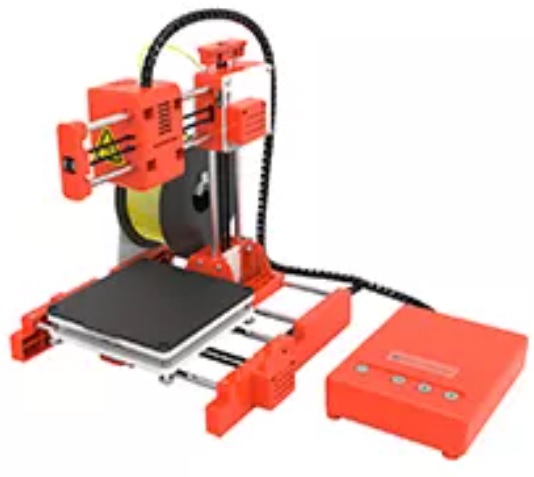CLICK HERE TO DOWNLOAD
THE MOST RECENT VERSION OF THE MANUALFrom Wikipedia (https://en.wikipedia.org/wiki/3D_printing):
3D printing, or additive manufacturing, is the construction of a three-dimensional object from a CAD model or a digital 3D model.[1] The term "3D printing" can refer to a variety of processes in which material is deposited, joined or solidified under computer control to create a three-dimensional object,[2] with material being added together (such as plastics, liquids or powder grains being fused together), typically layer by layer.In recent years, 3D printing has become accessible to students, hobbyists, and makers. The knowledge and skills to create 3D printed objects can be useful in many ways, including preparing one for academic success, employment opportunities, entrepreneurship, and more. The cost of 3D printing has been falling, but is still high enough that it may be out of reach to many. This 3D printer lending library program was inspired by the availability of low cost hardware, initial availability Windows computers, and the notion that people may want to have a trial 3D printer experience before making their own investment.
The essence of this program is that a package containing everything needed to initially explore 3D printing can be borrowed for a period of time, perhaps one to two months. This includes a 3D printer, a Windows computer loaded with software and other resources for initial success and some filament. This is being made possible through the donation of Windows touchscreen computers, keyboards and mice from PRC-Saltillo (https://www.prc-saltillo.com/) in Wooster and the donation of 3D printers, PLA filament and other support items and materials from Romich Foundation (https://romichfoundation.org/) in Creston.
The initial 3D printer being used in this program is the EasyThreeD Model X1. This 3D printer uses PLA filament and has a working volume of about a 4” cube. Other 3D printers may be used. Here is a video introduction to the initial model: https://www.youtube.com/watch?v=Df3tDtfwWAA. Keep in mind that the printer will have been assembled and tested before being given to a borrower.
While Romich Foundation provides overall support, local administration is being hosted by various organizations. The hosting organization identifies an administrative contact person and a technical lead.
The administrative contact is responsible for informing the local potential borrowers of this opportunity and identifying and communicating with the individuals who will borrow the package. This person will maintain records of placements, assure that the packages are complete (including sufficient PLA filament) and operational and configured for lending. This role will include procuring additional PLA filament as needed. At least initially, Romich Foundation will provide PLA filament. In general, the intent of this program is to act as an equalizer, giving first priority to disadvantaged individuals.
The technical lead will be available to support the technical and operational needs of the borrower. This may include assisting with troubleshooting and teaching the operation of the printers and software.
These two roles may be filled by the same person. The administrative and technical leads will have access to contact information on their peers in other hosting sites.
The needed technical skills of the borrower can range from minimal to advanced, depending on the end goal. This can be as simple as locating and downloading from the Internet a file for an object to be made. A more advanced user may wish to draw 3D objects using a free drawing program. It is also possible to modify objects or to create an object from photos.
In time, it is expected that local networks will be established, in which people with knowledge and experience will be able to assist relative newcomers.
A document that introduces the notion of 3D printing, provides some step-by-step instructions, and offers many resources, most of which are free, is being provided as part of the lending package. Use the link at the top of this page to download the document. Suggestions for improvement are invited.
The Romich Foundation contact is:
Barry Romich, P.E.
Romich Foundation
13875 Cleveland Road
Creston, OH 44217
330-464-7877
bromich@aol.com
